Airbnb House Rules: Examples and a Free Template for Hosts
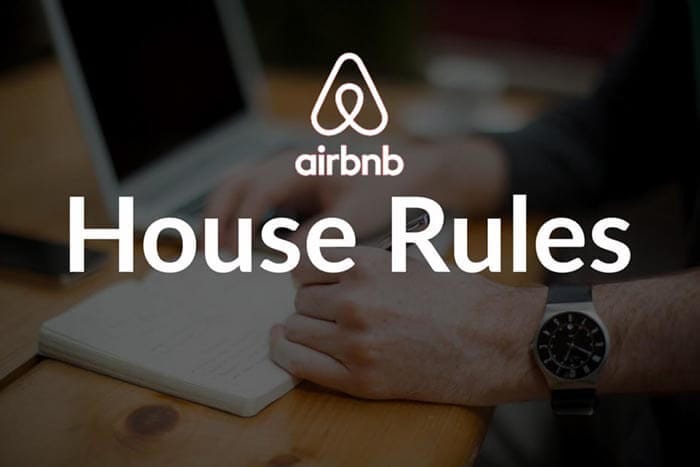
Whether you’re renting your home for just a few weekends of the year using Airbnb, or it’s a year-round business – all Airbnb hosts and managers need to have Airbnb house rules. The house rules for your property are just as important as your Airbnb listing. People just need a bit of information and direction about your home and what you allow.
If you’re looking for a way to streamline the management of your rental and ensure all guest communications are clear, consider iGMS. iGMS is a professional tool that automates routine tasks in managing short-term rentals, from guest communication to handling bookings and reviews. Learn how iGMS can simplify your Airbnb management and help maintain excellent guest relations.
If you’ve never written Airbnb rules, you may be a bit lost on where to begin. We’ve created this step-by-step guide to help you out!
What are Airbnb House Rules?
House rules give Airbnb hosts the opportunity to professionally and clearly state what the guests can or cannot do, what is expected of them, and what the possible penalties are if the rules are broken.
Before you sit down to write your Airbnb house rules, think of the type of potential guests that your home might attract and their possible demands. Will your guests tend to be grandparents, families with young children, professionals, or the under 25 party-type crowd? Be sure to write the house rules based on the type of possible guests that may rent your property.
The onus is on the rental owner to write the house rules. You may prefer them to be serious rather than fun or formal. Regardless of the style, there are certain house rules that all hosts should address.

Tips on Creating House Rules (Without Using an Airbnb House Rules Template)
Drafting house rules on Airbnb can be an intimidating process. We advise that hosts start with their ground rules – these are the non-negotiable rules for guests that hosts are unwilling to compromise on. This includes smoking, pets, and children. Your house rules on Airbnb are your choice and, as it is your property, how you manage a suspected or actual violation of your rules is your choice.
House rules tip 1. Keep the rules simple and don’t over complicate them.
House rules tip 2. Don’t leave anything in the rules left open for interpretation. Be as explicit as possible.
House rules tip 3. Look through your Airbnb house rules from time to time. It might happen that over time you want to modify your list based on your hosting experience.
What to Include in Your Airbnb House Rules
Effective airbnb house rules are simple and easy to follow. Make your guests aware of these rules before they check into your Airbnb listing. Most guests will follow your rules (smoking rules especially) without complaint but as an Airbnb host, it’s your Airbnb business and you can design your rules as you choose.
Custom rules help set expectations for your guests and if a guest breaks the rules of your Airbnb listing, you can deal with them through Airbnb if you deem the violation serious enough.
Opening statement
Set the tone in a few words explaining why you have the house rules and why guests should follow them. Mention that failure to adhere to the rules may result in deductions from the security deposit (or other penalties).
Parking
Let the potential guests know about the parking rules before sending the copy of the Airbnb house rules or include it in your automatic messaging enabled by iGMS.
Questions to consider about parking are:
- Are your guests able to bring their own vehicles?
- What is the maximum number of cars allowed?
- Where can they park?
Off-limit areas
If there are any areas in your house that are off-limits to your guests, it is a good idea to outline them in your house rules.
Smoking
No matter if you are a smoker yourself or not, you should seriously think about banning smoking at your rental. Not all guests will put cigarette butts in a trash bin which means that you can end up finding them lying around your property.
Besides, not all guests will be able to put up with the cigarette odor of your rental. It will be extremely difficult to remove it, once you decide to turn your rental into a non-smoking place.
Parties and events
If you don’t want your house to turn into a complete mess after a raging party, make sure to add the “no parties” rule to your house rules list. To prevent parties at your rental, be very specific about the number of guests/visitors.
Avoid words such as “a few” and “a couple”, otherwise some guests can invite 15 visitors, arguing that it is just “a small gathering”.
The “no parties” rule will protect your house from damages and your wallet from having to pay for an “early renovation”. In addition, your rental will be a safer place without parties, as sometimes things might get out of control after a dozen cocktails.
Visitors
Think about if you’ll allow any extra visitors or if only registered guests will be allowed. If you are fine with your guests bringing anyone along, it is still a good idea to limit the number of visitors. This will help you to protect your rental from additional wear and tear and extra usage of the provided supplies.
Make sure to set fees for extra overnight visitors and ask your guests to approve them in advance.
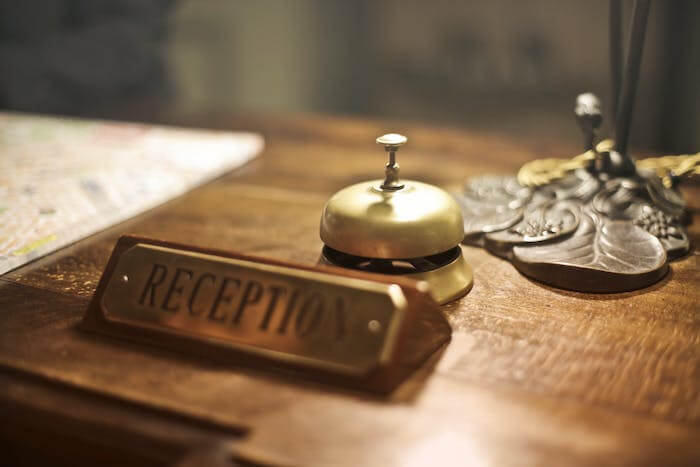
Noise and the neighborhood
Highlight the rules against excessive noise late at night and/or disrupting the neighbors. Set hours when your guests need to keep noise to a minimum as well as penalties they may face if they break your rules.
Laundry
Let your guests know whether you allow them to use your washer and dryer. Is there a limit on how much laundry they can do?
Though a washer and dryer is one of the most searched for amenities and can bring you more bookings, Airbnb hosts often report problems connected with guests doing laundry at their short-term rental. These include forgotten clothing items, sand from the beach or a dryer clogged with lint.
Eating areas
Decide on whether your guests may eat in all the rooms of your property. If you do have designated eating areas, let them know in your house rules.
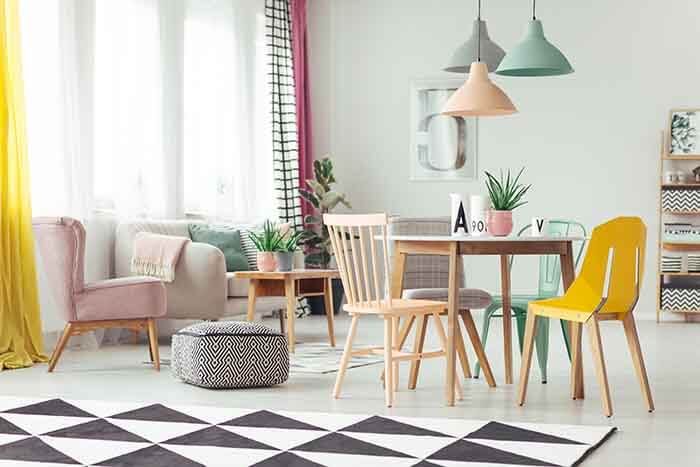
In fact, by restricting areas where your guests can enjoy their food you can save hours at the laundry. If guests are allowed to eat everywhere they want, stains on your sofa or even bed covers are unavoidable. Therefore, consider which areas of your house guests may use for their meals.
Barbeque
If your property has a barbeque that guests can use, be sure to leave instructions on how to set it up, how to use it, as well as how to properly clean it.
Garbage and recycling
Include details on how to dispose of the garbage and where exactly your guests need to throw it out.
This will help ensure that your property is kept well with proper cleaning, and you’re not left with a huge pile of trash on checkout day.
Hot tub/Swimming pool
If your property has a hot tub/swimming pool, ensure to lay out the safety rules and restrictions regarding the time of day that they can access the pool as well as any prohibited items in the pool area.
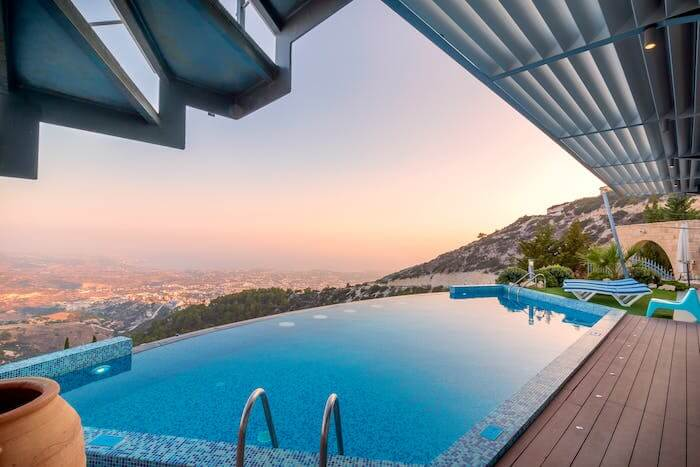
Balcony/Deck area
Balconies and decks are a great space to congregate and take in the views of the city. However, they may pose a hazard to younger children. Ensure to include safety rules regarding the use of these spaces.
Pets
Let guests know the rules and/or restrictions regarding pets and pet sizes.
It is up to you to decide whether or not you allow pets at your vacation rental. As more people are traveling now with their furry friends, it makes sense to consider making your rental pet-friendly. By applying a few tweaks to your property, you can set it up for pets and charge a higher rate.
However, opening your property to travelers with pets has some cons to ponder:
- Travelers with pet allergies won’t book your place.
- Your property will be prone to extra damage and wear and tear.
- You might find your place messy and untidy if a pet owner fails to look after their pet’s needs.
- Your property might require extra cleaning because of hair lying everywhere.
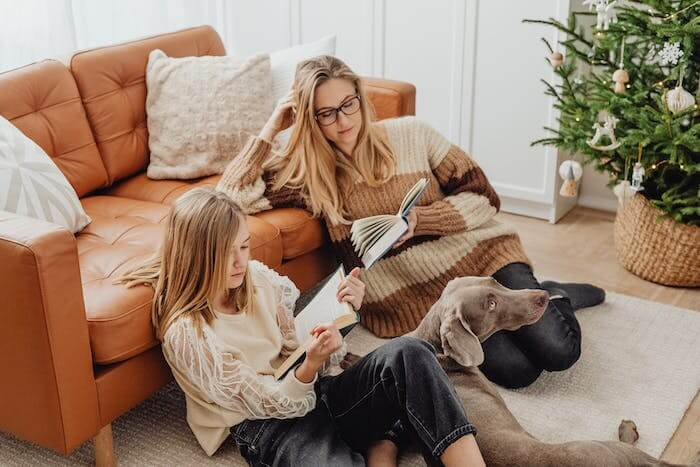
Security
Remind guests that their belongings will be kept safe and secure if they remember to close and lock all the doors and windows before leaving the property. This would also be a good opportunity to remind guests to turn off the lights and air conditioner before leaving the premises.
Damages and breakages
Let guests know what they should do if they break or damage something at your property. For cases when the cost of the damage exceeds the security deposit, make sure to mention that the costs will be billed to guests and reported to Airbnb.
Checkout arrangements
Mention what guests should do before they checkout. Include rules on cleaning, garbage disposal, and key handover.
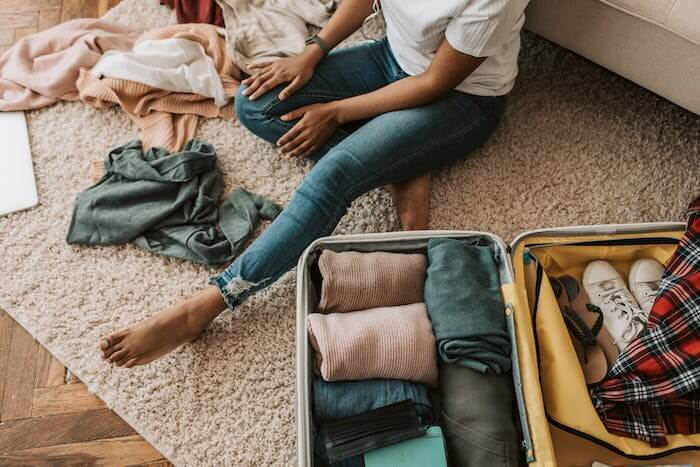
Emergency contact details
Provide emergency contact numbers in case anything goes wrong during your guests’ stay at your property.
Compliance
Clearly state what consequences your guests might face in case they fail to adhere to your rules (penalties, eviction, etc.).
Airbnb House Rules Examples

Here is a brief list of house rules that Airbnb hosts might want to include in their welcome book or Airbnb listing.
- Guests and visitors should comply with the parking regulations and requirements and must show consideration to other vehicles in the neighborhood.
- No shoes inside the home.
- No smoking inside the Airbnb. Cigarette butts must be disposed of in the ashtray provided in the backyard of the property.
- No parties or events.
- No unregistered guests or visitors allowed. The maximum property capacity is 4 people.
- Quiet time after 11 p.m.
- No eating or drinking in bedrooms. Please enjoy your meal in the dining room.
- Dispose of the garbage in the trash bin.
- Please use the swimming pool only between 10 a.m. and 3 p.m.
- Keep a close eye on your kids while being on the balcony.
- No pets allowed.
- Make sure to turn off the lights, air conditioning, and any electronics when you leave the house. Don’t forget to close the windows and lock the door.
- Report any damages and/or breakages in a reasonably timely manner. Damages exceeding the security deposit amount must be paid by guests and will be reported to Airbnb.
- Wash the dishes, and throw out the garbage before checkout.
Keep Your House Rules Fair
You do not need to include every house rule we’ve drafted, but just think about your pain points and the things that have happened in your property in the past. Draft a set of house rules for your vacation rental that proactively addresses those concerns. And remember, don’t write house rules that are overly strict because your house rules document will very quickly be ignored by your guests.
As you can see in our Airbnb house rules template above, we cover every eventuality for your vacation rental, as well as many more management tasks with our comprehensive software. If a guest violates your own house rules and breaks those critical ground rules, involve Airbnb and try to resolve the issue.
Conclusion: Airbnb House Rules – the Key to Your Property’s Safety
Having the right Airbnb house rules that match your home and preferences will help avoid accidents and reduce guest damage to your property. Remember to keep your house rules simple yet explicit. When your guests understand your rules, it should give you more peace of mind and feel more in control.
Consider getting some extra help with your short-term rental management by trying out iGMS.



![How to Start a Property Management Company [9 Tips + Interview]](/content/images/size/w600/2026/02/Checkin-Interview.png)

